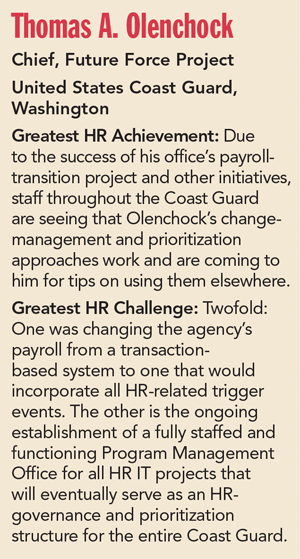This article accompanies Ever Upward.
When Thomas Olenchock first got his orders from the U.S. Coast Guard three years ago assigning him to the job he now holds – Chief of Future Force Project, a business-development and HR think tank – one of the supervisors in charge of his hire said to him, “Congratulations, you are now the Lion King on this island of misfit toys.”
In mentioning the movie and mixed metaphor, the supervisor was referring to the Coast Guard’s siloed HR organization, where all HR projects and talent-needs assessments were handled in each specific domain as separate functions – from medical to payroll to employee surveys to HR IT. But Olenchock, with a rich background that includes marine and environmental science, chemistry, industrial and organizational psychology, and workforce analytics, is a critical and systemic thinker, not a silo guy.
Sure, the comment “was funny,” he says, “but it started bothering me; I didn’t see these projects as disconnected,” as the supervisor did. So almost on day one, Olenchock got all 2,000 Coast Guard HR professionals together to tell them that, “ ‘under HR, we’re not disconnected at all. [We’re all working toward the same goal,] getting individual Coast Guard people what they need, when they need it, to do what they want; i.e., the right person in the right job at the right time.’ “
But to achieve that, starting with the 50 human-resource-management-designated military officers under his jurisdiction, meant thinking holistically and prioritizing projects across the organization, especially given its declining budget. It meant developing an HR function in the CG officers’ corps where none had existed, including establishing and drafting performance standards and definitions of the critical competencies needed by the agency’s HR-management professionals, military and civilian. It meant coming up with the means to measure the capabilities, identify gaps and state the talent needs within HR. And it meant implementing an occupational analysis and leading his HR staff through what, for many, was the uncomfortable process of documenting the work they did so the overall talent-tracking and competencies standard could be drafted.
 Not only has Olenchock successfully drafted and published this standard, but the project earned him the Human Capital Management in Government award for Best Talent Development Program for 2015. It was also one of many reasons he was chosen to be a 2016 HR’s Rising Star.
Not only has Olenchock successfully drafted and published this standard, but the project earned him the Human Capital Management in Government award for Best Talent Development Program for 2015. It was also one of many reasons he was chosen to be a 2016 HR’s Rising Star.
Large-scale thinking also saw him through a revamp of the Coast Guard’s approach to change. Though project-management professionals were being assigned to large-scale, critical projects, many of those projects were failing to be adopted because people weren’t changing their behaviors and new processes weren’t being incorporated to align with the greater organizational goals.
Essentially, these PMPs, as they’re called, weren’t “getting the people to sign on to the change,” Olenchock says. So, to kick off this new approach to change, he set out to transform payroll from an antiquated transaction process to one that incorporates all HR-related trigger events – such as marriage and births – that automatically affect tax withdrawals, entitlements, etc. The challenge was to “make sure everyone understood what was changing, and how,” from supervisors to pay managers to individuals, so everyone was aware of, able to use and committed to the new process before its Jan. 1, 2015 launch.
His leadership in forging a CG-wide communication initiative – including one-on-one coaching, emails, mobile alerts and posters that reached all 48,000 non-civilians of the 80,000-employee agency (a “blitzkrieg of communications,” as he puts it) – was so successful that his change-management approach has been sought by other military services and has led to the establishment of a Change Management Center of Excellence that he now oversees. His influence and ability to gain buy-in from all departments (some more receptive than others) was also noted by his supervisor and nominator – Stephen Wehrenberg, director of HR strategy and capability – who called the success of the project “a direct reflection of Tom’s vision and inspiring leadership.”
Perhaps Olenchock’s biggest challenge, one he’s still in the throes of, is to build a Program Management Office that can serve as an agency-wide governance structure for all HR IT and business processes to ensure the IT staff, including system developers, are responsive to all the requirements of the HR function – something that was not the case in the recent past. Here again, prioritization of HR projects, across the Coast Guard, and a robust mapping structure of talent gaps, needs and competencies, will be the keys to its success, Olenchock says.
“We’re already hearing from other departments – medical, safety and work/life, for example – asking us to apply our PMO [approach] to their functions,” he says. “I take a lot of personal pride in that.” Indeed, there is much for Olenchock to be proud of – including 16 CG awards and commendations.
Wehrenberg describes Olenchock’s accomplishments as impressive.
“When [Tom] started working for me,” he says, “he took over a team that the previous supervisor had allowed to become isolated from one another, [but he] quickly saw the benefits of unity and the potential for synergy, and brought seemingly disjointed projects and people together… . I have no doubt that he is destined for success.”

